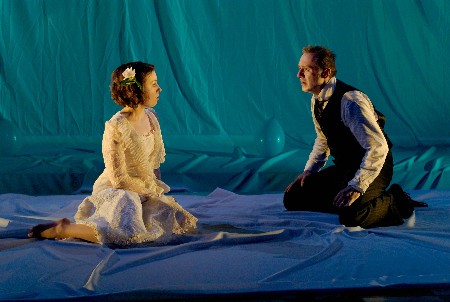Theater Review: ‘Adding Machine: A Musical’ – Pluses and Minuses
Why this is hell, nor am I out of it.— Christopher Marlowe, Dr. Faustus

Slaves in the Elysian Fields: Liz Hayes and Brendan McNab meet in the after-life in a scene from ADDING MACHINE: A MUSICAL. Photo: Mark L. Saperstein
Adding Machine: A Musical. Based on the play The Adding Machine by Elmer Rice. Original Music by Joshua Schmidt. Libretto by Schmidt and Jason Loewith. Directed by Paul Melone. Steve Bergman, Music Director. David Connolly, Choreographer. Susan Zeeman Rogers, Set Design. Gail Astrid Buckley, Costumes. Staged by the SpeakEasy Stage Company at the Boston Center for the Arts, through April 10.
Reviewed by Bill Marx
Given the staging of Clifford Odet’s 1935 Depression-era epic Paradise Lost at the American Repertory Theater and the award-winning musical adaptation of Elmer Rice’s 1923 play The Adding Machine at SpeakEasy Stage Company, Boston appears to be hosting a mini-boomlet of left-wing playwrights from the 1920s and 1930s.
Perhaps the hope is that these iconoclastic scripts, by exploring the underside of the American dream, shed light on current economic woes and cultural insecurities, particularly the assault on American exceptionalism. But both scripts come off as antiques, curios along the order of insects embalmed in amber. The application of music or video cameras can’t blow away the stony cobwebs.
The failure is different in each case. Odets wallows in sub-Chekhovian pathos, while Rice’s pale imitation of German Expressionism in The Adding Machine strikes me as little more than sub-Nietzschean melodrama, adolescent fatalism masked by blather about the tyranny of the “slave mentality.”
Rice has a reputation as a radical political playwright and as an influence on Odets, but the musical version of his play suggests that capitalism unbound (or, as the Texas textbook board would have it, the free market) isn’t to blame for the spiritual poverty of the proletariat. Adding Machine argues that the uninspired are responsible for their own misery. If they would make like supermen, disregard ethics and morality and grab for the gusto, all would be fine. Nothing here about the supermen-in-charge trying to monopolize the market.
Following in Rice’s footsteps, the creators of the musical give us the sad tale of Mr. Zero, an aptly named nebbish who is stuck in a lifeless marriage and job, a cartoon version of the American Everyman losing a zero-sum game. Zero has spurned the advances of the one woman, co-worker Daisy Devore, who loves him, adds figures for a living, and murders his boss after being told that, after 25 years of work, he is to be replaced by cost-cutting machinery.
For Rice, business’s mania for efficiency robs Zero of his human dignity. The musical’s adapters, Jason Loewith and Joshua Schmidt, touch on that message, but they are much more interested in how Zero creates his own inhuman hell in his head. The character is too hung up on morality and respectability (with its attendant xenophobia) to become a genuine individual. He deserves to be a cypher. After his arrest and execution, Zero goes to the Great Beyond where he is given a sentimental chance to break out of the cycle of abjectness. But it turns out, surprise, surprise, that the celestial assembly line has been rigged. No strikes allowed.

Soul-killing Business as Usual: Bob De Vivo, Leigh Barrett, Brendan McNab, Liz Hayes, David Krinitt & Cheryl McMahon in ADDING MACHINE: A MUSICAL. Photo: Mark L. Saperstein
Thus Adding Machine treats Rice’s play as a scathing indictment of Zero and other unimaginative American ilk. Adapters Schmidt and Loewith, to their creative credit, don’t do much to make Zero a sympathetic or heroic figure. The Brechtian catch is that Zero never becomes a compelling allegorical idea; his pathetic lot as a perma-slave doesn’t provoke you into thinking much of anything, aside from contemplating the silliness of the metaphysical set-up.
Zero and his friends are easy to dismiss as bigots and philistines—so the play no longer carries any satiric sting. What’s more, the choice to make Zero off-putting encourages earnestness. The moments of humor, such as a doo-wop version of a man confessing killing his beloved mother, are most welcome.
None of the material limitations should be laid at the feet of the SpeakEasy Stage Company’s fine production, which makes the antique doings about the permanent lower classes easy to take. Schmidt’s engagingly Sondheim-inflected score (in the program notes co-librettist Loewith admits the crucial influence of Sondheim and Weidman’s musical Assassins) is sung with aplomb and passion, especially by local legend Leigh Barrett.
The duet between the love-starved Daisy Devore of Liz Hayes and the lunk-headed Zero of Brendan McNab conjures up some welcome emotional power. Their performances are charged with a curious tension—somehow the actors have to float above, but not too far above, flat caricature. Sean McGuirk manages the same feat as The Boss and the transcendent lever-thrower—the über-suaveness of his voice insinuates a smug corruption underneath.
German Expressionism was on Rice’s mind, but thankfully director Melone chooses a more Beckettesque approach, providing an agile, minimal staging that emphasizes the isolation, power relations, and vulnerability of the characters. Because they are playing abstractions rather than individuals, the cast members can’t invest too much detail into their roles, though some smuggle in amusingly sardonic touches, such as the brutal, deadpan mug of David Krinitt’s prison guard and the comically sour rictus of Cheryl McMahon’s gossiping neighbor.
The SpeakEasy Stage Company gives Adding Machine: A Musical plenty of entertaining pluses, but even at a brisk clip of 90 minutes (no intermission), the production fails to compensate for an elemental minus: finding a way to make the musical adaptation of Rice’s stilted play worth taking seriously.

In the late 80s or early 90s, a Chicago company, Hystopolis Theatre, put on a full-stage, puppet version of the play that was successful in a way that no production I’ve seen has even come close to. The “otherness” of the imaginative staging not only matched the tenor of the play, but it also made it seem completely timely to present day. I think you, Bill, would have particularly appreciated the production. It traveled on to be part of the first Jim Henson International Festival of Puppet Theatre where it was a big hit, and I understand it may still be in their repertoire. Do see it if you ever come across it.
http://www.hensonfestival.org/archives/1992/hystopolis/hystopolis_main.html
http://puppet.wikia.com/wiki/File:Hystopolis_The_Adding_Machine_TheBoss.jpg
http://puppet.wikia.com/wiki/File:Hystopolis_The_Adding_Machine_TheParty.jpg
This is the first review I’ve read that got it right.
Brilliant! But are plays to be taken seriously or to enjoy?
Hi Carl:
Depends on the intention of the artist don’t you think? Some shows are made for sheer enjoyment—for example, musicals such as Guys and Dolls. It would be foolish to review the latter as if it was a meaningful comment on the world.
But Adding Machine—the play and musical—has pretensions, unless someone wants to argue it is just a silly satire on “the slave mentality.” Thus a critic should evaluate its points seriously.
Ideally, at its best, theater does what all art should do—speak to the heart and the head, make viewers think and feel something new about themselves and the world.
Bill Marx